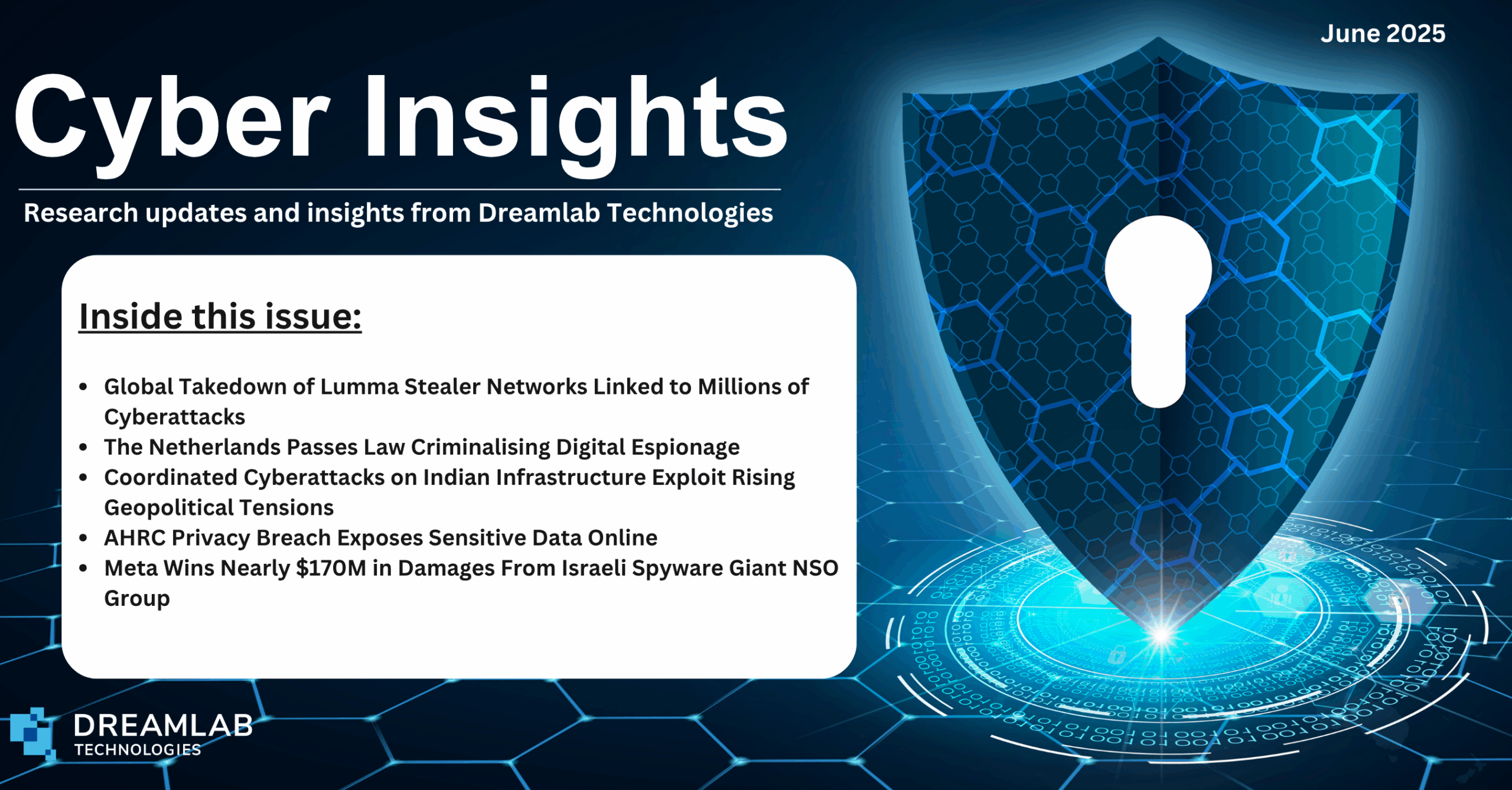
Dreamlab Technologies presents to you our brand new вАШCyber InsightsвАЩ newsletter вАУ an expert analysis of the latest developments in the cyber domain across the globe. The cyber world is a world full of opportunities but unfortunately faces new and emerging threats every day. This newsletter contains insights and trends in cyber security and emerging technologies that will help you stay informed regarding the threats and challenges in today’s rapidly evolving digital world. It also comes with a brief analysis of the cyber security events from a geo-political perspective. In the evolving geo-political dynamics today, cyber security is increasingly being prioritised by countries worldwide. Stronger cyber defence capabilities, higher investments in cyber security budgets and facilitating cyber policy dialogues are some of the new trends observed in the global geo-politics. The concise content in this paper provides a glimpse into this global scenario concerning the cyberspace. It is easy to read and can help promote awareness regarding best cyber security practices and safeguard our digital lives.
Inside this issue:
- Global Takedown of Lumma Stealer Networks Linked to Millions of Cyberattacks
- The Netherlands Passes Law Criminalising Digital Espionage
- Coordinated Cyberattacks on Indian Infrastructure Exploit Rising Geopolitical Tensions
- AHRC Privacy Breach Exposes Sensitive Data Online
- Meta Wins Nearly $170M in Damages From Israeli Spyware Giant NSO Group
In this edition, we dive into the global takedown of LummaC2 malware networks involved in cyberattacks since 2022, by the FBI and other international cyber security partners. The cyberattacks stole sensitive data linked to individuals, airlines, banks, hospitals, governments, and infected millions of devices across the world. The takedown operation targeted thousands of domains and disabled links between infected systems and the malware’s servers, inflicting economic and reputational damage on cybercriminals. We explore the tactics and techniques behind the malware attacks, along with key advisory warnings to enhance detection and strengthen defense efforts.
Next, across Europe, we take a look at the updated law passed by the Dutch parliament that criminalises a broader range of espionage activities, including digital and diaspora espionage. The law reflects growing concerns over non-traditional espionage, including political and economic influence efforts by foreign governments, and represents a broader strategy to enhance national security and protect high-value technologies. We study some of its provisions and take a look at the penalties for non-compliance.
Spanning Asia, we come across a report on the significant surge of cyberattacks targeting India’s critical sectors between April-May 2025 in a coordinated campaign by Pakistan-linked actors. The report reveals of parallel cyber operations taking place during the heightened military tensions following the April 2025 Pahalgam terror attack and during IndiaвАЩs counterterrorism operation вАШSindoorвАЩ. The cyberattacks targeted Indian critical infrastructure through sophisticated malware, with an aim to compromise sensitive information, manipulate public perception, posing significant risks to national security. This signals the evolving role of cyber operations in geopolitical conflicts, as cyberattacks increasingly merge with psychological operations- indicating a growing shift toward hybrid warfare.
Across Oceania, we delve into a breach incident caused by a vulnerability in the Australian Human Rights Commission (AHRC) websiteвАЩs online form submission system, that exposed hundreds of confidential documents online. The breach, however, was not caused by a cyberattack but due to unintended exposure through online forms on the AHRC website. The incident has raised serious concerns over the confidentiality of data through online submissions of personal documents and associated risks to vulnerable individuals. It ¬†highlights the need for scrutiny of data protection practices, implementation of robust data security measures, continuous improvement of security practices and strengthening of legal frameworks to protect data privacy and individualsвАЩ rights in the digital age.
And in Big Tech, Meta wins a 2019 case against the Israeli spyware giant NSO Group, over hacking and breach of contract. The ruling marks a major victory for other tech companies and privacy advocates as it sets a precedent for holding spyware makers accountable for aiding unauthorised surveillance activities. We study the ruling in detail and explore Meta’s ongoing plans to release transcripts to expose global spyware abuse, while supporting digital rights groups, and researchers. The incident underscores the need for international legal frameworks to address cross-border cyber intrusions and surveillance by spyware firms who repeatedly claim working for governments in countering criminal and terrorist activities.


